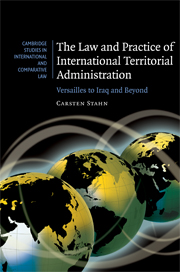Book contents
- Frontmatter
- Contents
- Foreword
- Preface
- Selected table of cases
- List of abbreviations
- Table of engagements
- Introduction
- Part I The historical and social context of international territorial administration
- Part II The practice of international territorial administration: a retrospective
- Part III The foundations of international territorial administration
- Part IV A typology of legal problems arising within the context of international territorial administration
- Part V International territorial administration at the verge of the twenty-first century: achievements, challenges and lessons learned
- Introduction
- 17 Strong on concept, imperfect in practice: international territorial administration as a policy device
- 18 International territorial administration and normative change in the international legal order
- Bibliography
- Index
- CAMBRIDGE STUDIES IN INTERNATIONAL AND COMPARATIVE LAW
17 - Strong on concept, imperfect in practice: international territorial administration as a policy device
Published online by Cambridge University Press: 19 January 2010
- Frontmatter
- Contents
- Foreword
- Preface
- Selected table of cases
- List of abbreviations
- Table of engagements
- Introduction
- Part I The historical and social context of international territorial administration
- Part II The practice of international territorial administration: a retrospective
- Part III The foundations of international territorial administration
- Part IV A typology of legal problems arising within the context of international territorial administration
- Part V International territorial administration at the verge of the twenty-first century: achievements, challenges and lessons learned
- Introduction
- 17 Strong on concept, imperfect in practice: international territorial administration as a policy device
- 18 International territorial administration and normative change in the international legal order
- Bibliography
- Index
- CAMBRIDGE STUDIES IN INTERNATIONAL AND COMPARATIVE LAW
Summary
The Report of the Panel on UN Peace Operations stressed one of the main dilemmas of the future management of international administration. It noted that the Secretariat may either “assume that transitional administration is a transitory responsibility, not prepare for additional missions and do badly if it is once again flung into the breach, or … prepare well and be asked to undertake them more often because it is well prepared”.
On the record – a response to some criticisms
Existing practice leaves few doubts that the UN should follow the second route. UN and international administrations have passed through different historical cycles and trials and errors in the exercise of mandates of territorial administration. Yet these imperfections do not call into question the validity and merits of the concept of international territorial administration as such.
International territorial administration and (ir-)relevance
The history of international territorial administration itself provides compelling testimony that there is a continuing “niche” for international administration in practice. International actors have exercised territorial authority in various forms and variations throughout much of the twentieth century. It is, in particular, important to keep in mind that international administration has historically fulfilled not only one, but four different functions, namely to facilitate a transfer of territory; to manage the realisation of claims of decolonisation and selfdetermination; to restore authority in a governance vacuum; and to implement the policy objectives of intervention.
- Type
- Chapter
- Information
- The Law and Practice of International Territorial AdministrationVersailles to Iraq and Beyond, pp. 733 - 750Publisher: Cambridge University PressPrint publication year: 2008
- 1
- Cited by

